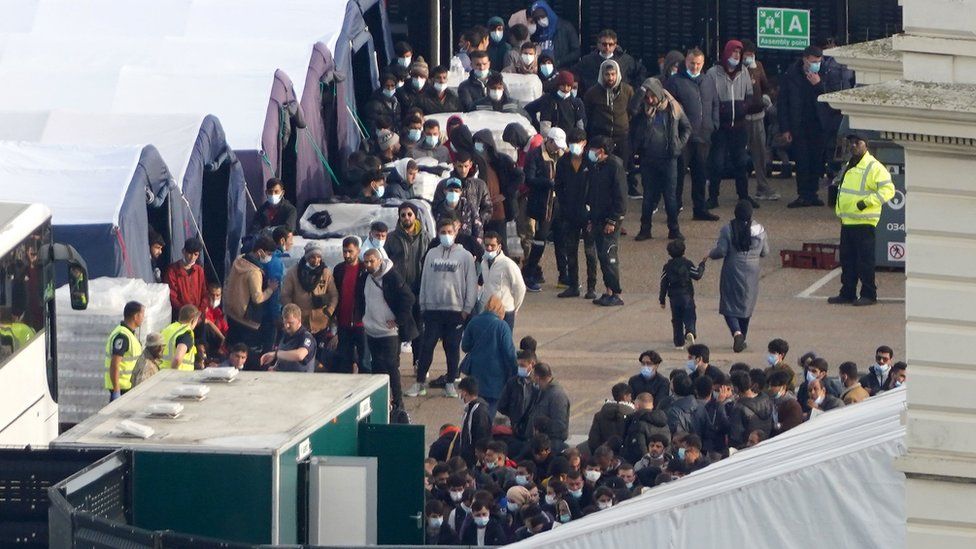 Above: migrants brought ashore at Dover after crossing the Channel on small boats (PA Media)
Above: migrants brought ashore at Dover after crossing the Channel on small boats (PA Media)
Earlier this week the High Court ruled that the government’s plan to deport asylum seekers was lawful.
Lord Justice Lewis and Mr Justice Smith dismissed claims that Rwanda has a record of mistreating asylum seekers and jailing or “disappearing” political opponents of its president Paul Kagame. The legal challenge, brought by asylum seekers, charities and the PCS union, was backed by the UNHCR which says Rwanda’s system for assessing refugees lacks the “minimum components of an accessible, fair and efficient asylum system.”
According to the Guardian, the UN knows of incidents where “someone seeking asylum in Rwanda had been refused and sent back to a country where they would be at risk of torture and ill-treatment. One was sent to Syria.”
In parliament Sunak, Braverman and the Tory benches were overjoyed, braying their support for a policy that not so long ago even some Tories would have regarded as unacceptable and only far-right outfits like the Brexit Party/Reform UK would have put forward.
It has to be said, too that Labour’s front bench response was not impressive, with shadow Home Secretary Yvette Cooper concentrating her fire upon the practical, rather than moral, shortcomings of the scheme. Only the SNP’s Alison Thewliss called out the scheme for what it is: “immoral” and a “disgusting attempt to cover up domestic policy failings.”
However, this “victory” may well turn out to be more symbolic than real for the Tories: the claimants will certainly appeal and the case will then go to the Court of Appeal and the Supreme Court, taking months or even years, meaning the first deportation flight may still be years away, despite Braverman’s pledge to get deportations happening “at scale as soon as possible.”
Back in June, when the government first attempted to implement the Rwanda plan, the ‘Free Movement’ website carried the following devesating critique, which deserves to be repeated:
This is a moment of national shame. One of the richest countries in the world, hosting one of the lowest numbers of refugees internationally, has paid a developing country to take a handful of genuine refugees off our hands.
The government simultaneously argues that Rwanda is a beacon of human rights and economic prosperity and that removing a few refugees there will be so awful for them that it will deter others from following in their footsteps. It is a classic example of Johnsonian “cakeism”, of having it both ways. The reality is that an unfortunate few are being punished in order to discourage the others.
The British record of forcibly relocating the poor and people of colour around the world is hardly a glorious one. Continuing this legacy into the 21st century is immoral, particularly when those affected are refugees. The fact that we have so far [rightly -JD] welcomed 70,000 refugees from Ukraine and 114,000 from Hong Kong on uncapped schemes at the same time as attempting to remove a few hundred to Rwanda blows out of the water the idea that this policy is about our inability to integrate and welcome newcomers.
Those given notices of removal to Rwanda came from Syria, Afghanistan, Iran and other countries. The vast majority were genuine refugees who would have won their asylum claims had they been decided here in the United Kingdom. The latest government statistics show that three out of four initial Home Office asylum decisions are grants of asylum. Success rates are even higher for some nationalities: 98% for Syrians, 91% for Afghans and 88% for Iranians. A significant proportion of those rejected go on to secure asylum from a judge — half of all asylum appeals ultimately succeed.
None of those removed to Rwanda have any connection to that country. The Memorandum of Understanding between the United Kingdom and Rwanda makes clear that they will need to apply for asylum on arrival. If Rwanda grants them asylum, they will be given refugee status there. Their prospects for meaningfully rebuilding their lives in a strange country and culture, with no existing community and poor economic prospects, are surely very low.
If Rwanda refuses their asylum applications — which may well be the case given that even the Home Office country information suggests there are no relevant interpreters, no asylum lawyers and no experience of dealing with claims from the relevant countries — then Rwanda will be responsible for sending them back to their home countries. The reality is that they will probably move on and try to head back to Europe, placing themselves in the hands of people smugglers and traffickers.
Meanwhile, a YouGov poll makes a nonsense of Braverman’s claim that the Rwanda scheme is “what the overwhelming majority of the British people want to see happen”:
The poll, released on December 19, shows that only 10% of Britons support the Rwanda scheme. The most popular alternative, with the backing of 39%, is for the government to make it easier for people to apply for asylum in Britain from overseas so they did not need to attempt the channel crossing in the first place.
Also worth reading on this subject:
- Barrister Colin Yeo’s detailed analysis of the ruling.
- Michela Wrong, writing in Tuesday’s Guardian.
- Some interesting legal observations from the ‘Law and Policy’ blog.